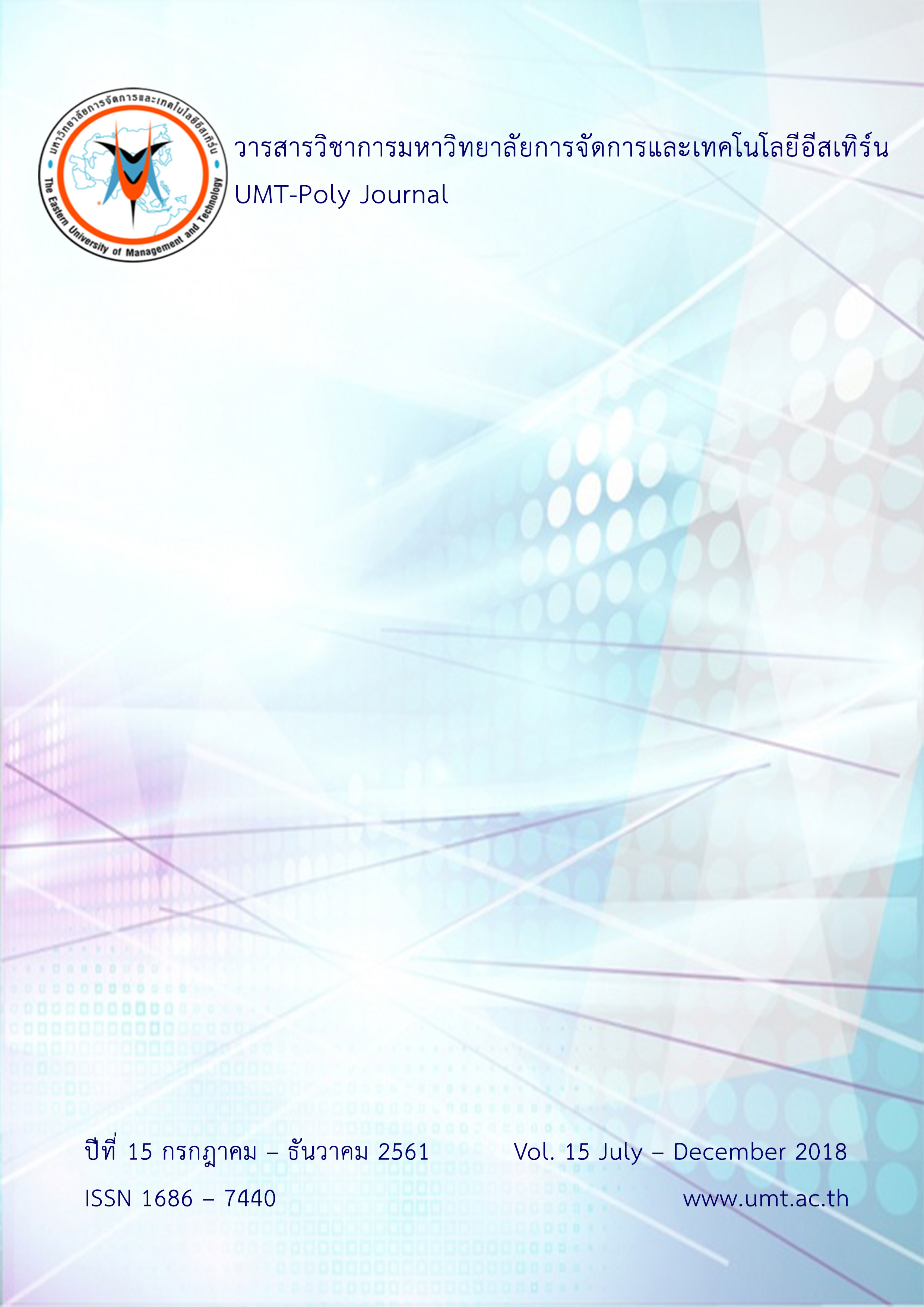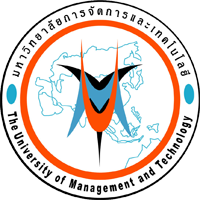DEVELOPMENT OF EDUCATION MANAGEMENT FOR STUDENT CITIZENSHIP INDICATORS IN ELEMENTARY SCHOOLS
Keywords:
Indicators, Student Citizenship, Elementary SchoolAbstract
The research aimed to development of education management for student citizenship indicators in elementary schools. The research were 3 stage; stage 1: synthesize the indicators by using literature review and interview with 7 key informants to define conceptual framework and development of indicators then using 5 experts examined the content suitability of the indicator; stage 2: evaluation of indicator by proposing 15 experts to evaluate the suitability and feasibility of the indicator with an evaluation form, analyze by means of the mean and standard deviation in each indicator and then improve upon the opinions and suggestions of theoretical experts; and stage 3: confirmatory factor analysis of the indicators. Samples were 490 administrators and teachers in elementary schools under the inspection area 13 by using multiple-stage random sampling. The instruments were questionnaire, suitability and feasibility evaluation form of the indicator, and indicator check form. The data were analyzed by using content analysis. The statistics used in the research consisted of mean, standard deviation, and confirmatory factor analysis by using Mplus.
The research findings were as follows: 1) Citizenship indicators of students in elementary school had overall evaluation results of suitability and feasibility at the highest level (= 4.92, 4.63). And the verifiable indicator with the confirmatory factor analysis, it was found that measurement model of citizenship of students in elementary school which citizenship was a latent variable, and knowledge, characteristics, and civic behavior were observable variables. Be fit with empirical data that chi-square was not statistically significant (=39.418, df=29, p=0.092, CFI = 0.993, TLI = 0.982, RMSEA =0.019, SRMR =0.011 and / df = 1.359). The conclusion were 3 aspects with 74 indicators consisted of (1) knowledge (2) characteristics and (3) behavior that were appropriate to be indicators of student citizenship in elementary schools. 2) Education management for student citizenship indicators in elementary school had overall evaluation results of suitability and feasibility at the highest level (=4.87, 4.67). And the verifiable indicator with the confirmatory factor analysis, it was found that measurement model of education management for student citizenship in elementary school which education management for student citizenship was a latent variable, and learning resource management, citizenship learning curriculum, and learning management and evaluation were observable variables. Be fit with empirical data that chi-square was not statistically significant( = 48.274, df= 36, p= 0.0830, CFI = 0.999, TLI = 0.998, RMSEA = 0.018, SRMR = 0.009และ / df = 1.341). The conclusion were 4 aspects with 38 indicators consisted of (1) learning resource management (2) citizenship learning curriculum and (3) learning management and evaluation that were appropriate to be indicators of education management for student citizenship in elementary schools.
Downloads
References
กรุงเทพมหานคร โรงพิมพ์ชุมนุมสหกรณ์การเกษตรแห่งประเทศไทย, 2552.
จันทนา บุญญานุวัตร์. องค์ประกอบที่สัมพันธ์กับคุณลักษณะของความเป็นพลเมืองดี นักเรียนชั้นมัธยมศึกษาปีที่ 3
เขตพื้นที่การศึกษาพัทลุง. วิทยานิพนธ์การศึกษามหาบัณฑิต สาขาการวัดผลการศึกษา มหาวิทยาลัยทักษิณ, 2549.
ชรินทร์ มั่งคั่ง. การศึกษาเชิงพหุวัฒนธรรมด้านความเป็นพลเมืองดี ในสาระการเรียนรู้สังคมศึกษา. สำนักวิชาการศึกษา
คณะศึกษาศาสตร์ มหาวิทยาลัยเชียงใหม่, 2553.
ณัฐพร แสงภู่. การศึกษาการดำเนินกิจกรรมนักเรียนตามโครงการเยาวชนคนดีศรีสุพรรณของสถานศึกษาขั้นพื้นฐานช่วงชั้นที่ 1 – 2
สังกัดสำนกงานเขตพื้นที่การศึกษาสุพรรณบุรี. วิทยานิพนธ์ครุศาตร มหาบัณฑิต มหาวิทยาลัยราชภัฎกาญจนบุรี, 2547.
นิรมล จันทรศิริ. ผลการจัดกิจกรรมการเรียนรู้โดยใช้เทคนิคแบบหมวกหกใบ เรื่องการปฏิบัติตนเป็นพลเมืองดีตามวิถีประชาธิปไตย
ชั้นประถมศึกษาปีที่ 4. การศึกษาค้นคว้าอิสระ ปริญญาการศึกษามหาบัณฑิต สาขาวิชาหลักสูตรและการสอน
มหาวิทยาลัยมหาสารคาม, 2551.
ประภัสสร ไพบูลย์ฐิติพรชัย. การศึกษาความเป็นพลเมืองดีของนักเรียนโรงเรียนพณิชยการบางบัวทอง จังหวัดนนทบุรี.
การค้นคว้าอิสระ ปริญญาศิลปศาสตรมหาบัณฑิต มหาวิทยาลัยศิลปากร, 2553.
ปลินธร เพ็ชรฤทธิ์. สภาพและปัญหาการจัดกิจกรรมการเรียนการสอนเพื่อพัฒนาคุณลักษณะความเป็นพลเมืองดีให้แก่นักเรียน
มัธยมศึกษา ของครูสังคมศึกษา. วิทยานิพนธ์ครุศาสตรมหาบัณฑิต จุฬาลงกรณ์มหาวิทยาลัย, 2550.
พูนภัทรา พูลผล. ผู้เรียนในศตวรรษที่ ๒๑ ควรเป็นอย่างไร. (ออนไลน์) 2557 (อ้างเมื่อ 17 ธันวาคม 2557) จาก
http://www.plearnpattana.ac.th/m465/index.php?option=com_content&task=view&id=3381&Itemid=75.
ไพบูลย์ ชาวกงจักร. สภาพและปัญหาการมีส่วนร่วมของสถานศึกษาในการดำเนินงานโครงการเยาวชนคนดีศรีสุพรรณ
สังกัดสำนักงานเขตพื้นที่การศึกษาสุพรรณบุรี เขต 2. วิทยานิพนธ์ครุศาสตรมหาบัณฑิต มหาวิทยาลัยราชภัฎเลย, 2549.
มรกต อนุเคราะห์. การพัฒนางานวินัยนักเรียน โรงเรียนบ้านต้นปล้อง สำนักงานเขตพื้นที่การศึกษาเชียงราย เขต 4 สำนักงาน
คณะกรรมการการศึกษาขั้นพื้นฐาน. วิทยานิพนธ์ครุศาสตรมหาบัณฑิต มหาวิทยาลัยราชภัฎเชียงราย, 2548.
ยุทธศิลป์ ผาอำนาจ. การศึกษาเกี่ยวกับแนวทางพัฒนาการดำเนินงานวินัยนักเรียน โรงเรียนบ้านอ่างบูรพาสังกัดสำนักงานเขตพื้นที่
การศึกษาหนองบัวลำภู เขต 1. วิทยานิพนธ์ครุศาสตรมหาบัณฑิตมหาวิทยาลัยราชภัฎเลย, 2550.
ฤาชุตา เทพายากุล. วารสารเรียนรู้ประชาธิปไตยปีที่ 3 ฉบับที่ 9 มกราคม – มีนาคม 2554. สงขลา:
มาสเตอร์พีช แอนด์ โครเชท์, 2554.
วิลาวรรณ รพีพิศาล. การบริหารทรัพยากรมนุษย์. กรุงเทพฯ: วิจิตรหัตถกร, 2554.
ศักดิ์ชัย นิรัญทวี. การวิจัยเอกสารการจัดการเรียนรู้เพื่อพัฒนาผู้เรียนให้เป็นพลเมืองดี. สำนักงานเลขาธิการสภาการศึกษา
กรุงเทพฯ : พิมพ์ดีการพิมพ์ จำกัด, 2548.
ศรัณยู หมั้นทรัพย์. การศึกษาเพื่อสร้างพลเมือง: ฐานรากของการเมืองภาคพลเมือง. วารสารสถาบันพระปกเกล้า.
ปีที่ 6 ฉบับที่ 2 ( พ.ค.-ส.ค. 2551) หน้า 101-115.
สิริวรรณ ศรีพหล. รายงานการวิจัย เรื่องการพัฒนาชุดฝึกอบรมทางไกลเรื่องการจัดการเรียนการสอนเพื่อพัฒนาลักษณะความเป็น
พลโลกของนักเรียนสำหรับครูสังคมศึกษา. นนทบุรี : สถาบันวิจัยและพัฒนา มหาวิทยาลัยสุโขทัยธรรมาธิราช, 2551. สุจิตรา วันทอง. การวิจัยและพัฒนาการจัดกิจกรรมการเรียนรู้โดยใช้การวิจัยเป็นฐานเพื่อพัฒนาคุณลักษณะพลเมืองดีตามวิถี
ประชาธิปไตยของนักเรียนประถมศึกษา วิทยานิพนธ์ ครุศาสตรมหาบัณฑิต จุฬาลงกรณ์มหาวิทยาลัย, 2554.
สํานักงานข้าราชการครูและบุคลากรทางการศึกษา กระทรวงศึกษาธิการ. รวมกฎหมายกฎ ระเบียบการบริหารงานบุคคลด้านกฎหมาย
ของขาราชการครูและบุคลากรทางการศึกษา. กรุงเทพฯ : โรงพิมพคุรุสภา, 2553.
อิทธิพล ปรีติประสงค์. สังเคราะห์ความรู้ที่ได้จากการถอดบทเรียน การพัฒนาเยาวชนพลเมืองสิงคโปร์ จากเครือข่ายเยาวชน
สิงคโปร์ (ออนไลน์) 2557 (อ้างเมื่อ 14 มกราคม 2558) จาก https://www.gotoknow.org/posts/522077.
Ballard, P.J., Cohen, A. K., and Littenberg-Tobias, J. “Action civics for promoting civic development: main effects of
program participation and differences by project characteristics,” Am J Community Psychol. 2016, 58:
377–390. DOI 10.1002/ajcp.12103.
Bengtsson, A. “Educating European citizenship: Elucidating assumptions about Teaching civic competence,”
Policy Futures in Education. 2015, 13(6) 788–800. DOI: 10.1177/1478210315595785.
Bentler, P. M. and Chou, C. “Practical issues in structural modeling,”. Sociological Methods and Research.
1987, 16 : 78-117.
Blair, T. “New Community, New Individualism,” Speech given to the Charities’ Aid Foundation 10th Arnold
Goodman Charity Lecture, London, 8 July 1993, New Britain: My Vision of a Young Country, London:
Fourth Estate 1996: 14–79.
Davies, I. “Citizenship education in Europe,” Children's Social and Economics Education, 1998 3 (3) : 127-140.
Galston, W. A. “Political Knowledge, Political Engagement, and Civic Education,” Annual Review of Political
Science, vol. 4, 2001, pp. 217-34; available at www.civicmissionofschools.org; and fact
sheets developed by CIRCLE, available at www.civicyouth.org.
Giorgio Di Pietro, G. D., Delprato, M. “Education and Civic Outcomes in Italy,” Public Finance Review,
2009 37(4) : 421-446.
Isac, M.M., Maslowski, R. and Werf, G.V. “Effective civic education: an educational effectiveness model for
explaining students' civic knowledge,” School Effectiveness and School Improvement,
2011 (22)3, 313-333, DOI: 10.1080/09243453.2011.571542.
Kerr,D. “Citizenship Education in England: The Making of a New Subject,” Journal for Social Science Education,
2003, 2 (2) : 1–10.
Koutselini, M. and Papanastasiou, C. “Civic Education in Cyprus -Issues in Focus: A Curriculum Research Study,”
Children's Social and Economics Education; 1997 2 (3), 113-129.
Lenzi, M. and others. “How school can teach civic engagement besides civic education: the role of democratic
school climate,” Am J Community Psychol, 2014 54 (6) : 251–261. DOI 10.1007/s10464-014-9669-8.
Marker, G., and Mehlinger, H. Social studies. In P. W. Jackson (Ed.). Handbook of research on curriculum.
New York: Macmillan, 1992.
Murphy, J. B. “Against civic education in public schools,” International Journal of Public Administration. 2007,
30: 6-7, 651-670, DOI: 10.1080/01900690701216019.
Sears, A. M. and Hughes, A. S. “Citizenship education and current educational reform,” Canadian Journal of
Education; 1996, 21 (2) : 123–142.
Youniss, J. “Civic Education: What Schools Can Do to Encourage Civic Identity and Action,” Applied
Developmental Science; 2011 15 (2), 98-103, DOI: 10.1080/10888691.2011.560814.
Downloads
Published
Issue
Section
License
ประกาศลิขสิทธิ์
เนื้อหาและข้อมูลในบทความที่ลงตีพิมพ์ในวารสารวิชาการมหาวิทยาลัยการจัดการและเทคโนโลยีอีสเทิร์น ถือเป็นข้อคิดเห็นและความรับผิดชอบของผู้เขียนบทความโดยตรง ซึ่งกองบรรณาธิการวารสารไม่จำเป็นต้องเห็นด้วยหรือร่วมรับผิดชอบใด ๆ
บทความ ข้อมูล เนื้อหาหรือรูปภาพ ฯลฯ ที่ได้รับการตีพิมพ์ในวารสารวิชาการมหาวิทยาลัยการจัดการและเทคโนโลยีอีสเทิร์น ถือเป็นลิขสิทธิ์ของวารสารวิชาการมหาวิทยาลัยการจัดการและเทคโนโลยีอีสเทิร์น หากบุคคลหรือหน่วยงานใดต้องการนำข้อมูลทั้งหมดหรือบางส่วนไปเผยแพร่ต่อหรือเพื่อกระทำการใด ๆ จะต้องได้รับอนุญาตเป็นลายลักษณ์อักษรจากวารสารวิชาการมหาวิทยาลัยการจัดการและเทคโนโลยีอีสเทิร์นก่อนเท่านั้น




